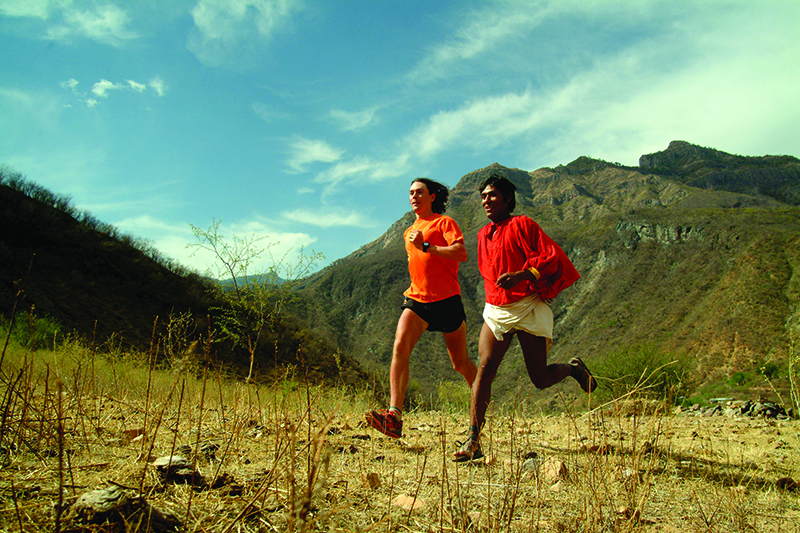One hundred and sixty-five miles in 24 hours; 100 trail miles in 15 hours 36 minutes; 100 kilometres in seven hours 28 minutes; 50 trail miles in six hours 21 minutes; 50 road miles in five hours 50 minutes; a road marathon in two hours 38 minutes; three consecutive Spartathlon victories; seven consecutive Western States 100-Mile Endurance Run victories; a Badwater Ultramarathon course record set in 49°C heat in Death Valley.
The running career of Scott Jurek boasts some mightily impressive numbers, but numbers alone do not do him justice. Times and distances don’t tell the whole story. They omit details, and details are what separate a runner with remarkable stats from a genuine running hero.
The numbers alone do not tell you, for instance, that Scott Jurek won the Badwater Ultramarathon, a 135-mile race widely regarded as one of the world’s toughest, despite a swollen broken toe, or that he won the Hardrock 100-mile endurance race, which contains more cumulative ascent than Everest, on a badly sprained ankle. Numbers don’t tell you that he performs these mindboggling feats of endurance on a vegan diet, having ignored the countless calls of “you won’t get anywhere without animal protein!”
They don’t tell you that one of the world’s finest endurance athletes grew up a scrawny kid the others called “Pee-Wee”, or that Pee-Wee was diagnosed with high blood pressure aged 12, didn’t want to take the pills the doctor prescribed, so set about controlling his blood pressure using mind control.
The numbers, no matter how impressive, cannot do justice to the desire, drive and determination that have enabled Scott Jurek to achieve the things he has, and made him the man he is.
Those who have heard of Scott Jurek tend to rate him as highly as any athlete. In a recent poll on our Facebook page, given the choice of going for a run with Jurek or Mo Farah, it was the ultra-running American who edged it. MR reader Brad Keast said: “The bloke is a legend. The 24-hour circuit race he did is incredible from a mental and physical perspective.”
But that’s amongst men who take their running seriously. Among more casual runners, your likelihood of having heard of Scott Jurek probably hinges on whether or not you have read Chris McDougall’s Born to Run. The bestselling book, which covers a secretive, running-obsessed Mexican tribe known as the Tarahumara, includes Jurek as one of the elite runners who went to find out more about them, before taking them on in a 50-mile race across the Copper Canyons. That Jurek didn’t win that race should not come as a great surprise; taking on the Tarahumara on their home turf is like pitching up to the Colosseum with a small stick and expecting to take on 100 gladiators. There was no shame in coming second; quite the opposite, in fact. Nonetheless, Jurek returned the following year, took on the finest Tarahumaran runners once more, and won.
It is that spirit which perhaps defines Jurek. His refusal to accept defeat. For all his success, for all the records broken, he has experienced as much disappointment as any other runner. He has lost races he hoped to win, and, worse, had to drop out of races due to injury, illness, or a combination of both.
“Initially I feel bummed out,” he says, describing what it feels like when things don’t go to plan. “I let myself be depressed for a little bit, but then try to pull myself out of it, and ask myself what I can learn from it – was there something I could do differently going forward? I have to assess and analyse the situation, not just dwell on the fact I screwed up. Ultimately, those are the races I’ve learnt the most from. As difficult as it is to go through the disappointment, those races benefit you and help you grow more than any others.”
Something Jurek learnt a long time ago was that meat is not his friend. After spending his teenage years eating anything and everything he could afford in order to fuel his extremely active lifestyle and add muscle to a naturally skinny frame, Jurek discovered the benefits of vegetarianism by accident. Queuing in McDonald’s, where Jurek ate four times a week, he met a woman called Leah, who would later become his first wife. Leah was mostly vegetarian, and opened Jurek’s eyes to the variety of food available without needing to rely on meat. As his diet changed, Jurek noticed that he felt fitter and stronger.
Even with the perfect diet, running the equivalent distance of five marathons back to back, across terrain even the most hardy of hikers would baulk at, takes its toll.
“Everybody assumes that, for the top runners, everything goes smoothly and we never have thoughts of wanting to quit,” says Jurek. “They’re wrong. All the top runners have those same feelings. We all hurt, just like everybody else. It’s not like we glide from start to finish with no pain and discomfort.
“In those moments, it’s important to have something to pull you out of those low points. I was running the 24-hour World Championships a few months after my mother passed away. There were times during the race when I thought, ‘Why am I doing this? I could be at home, sitting on the couch, a lot more comfortable. This is ridiculous. I’m going crazy. I’ve got to stop, it just hurts too much.’
In those times, I drew on the memory of her and thought, ‘Why am I out here running?’ That was enough to make me keep going, even though I wanted to stop.`’
Having recently turned 40, Jurek is in the twilight of a peerless running career.
“I’ve done these things so many times; I know the pain and discomfort so well. I don’t feel like I’m ever proving anything to anybody or to myself by winning a race. It’s a difficult thing: you need to have enough ego to want to win. All athletes, as they get closer to retiring, struggle with that. You start to think, ‘Do I really need to win this last race?’ Having that hunger was a lot easier when I was younger, because that’s what it was all about. Nowadays my brain is telling me, ‘You don’t have to do this’.”
“I’ve kind of set a timeline, because it’s really hard to say, ‘If I get this goal or this time, or when I run this last race, I’m done’. Next year will be my 20th year running ultras, and I’ve turned 40, so this feels like a good end point.”
Although Jurek speaks intelligently and convincingly about putting a full-stop on a career you couldn’t script, it’s clear that the burning desire is far from extinguished.
“I think I’m ready for it, but I’d like to get my American record back [his 24-hour record was usurped last year by Army Master Sgt. Mike Morton, who clocked 172.4 miles] or break the record in the 24-hour World Championships – that’s one of my last goals and would be amazing to do in the last stage of my career.”
When a sport has been such a big part of you, and you such a big part of it, there’s no way you could ever be truly separated from it, even if you tried. Jurek’s influence on runners will long outlast his own career.
In the end, perhaps words, like numbers, aren’t enough to do him justice. We’ll leave it to Matt Cameron, a runner and MR reader, to have the final, most fitting say: “For me, he is the greatest runner ever. His story makes me dream of what I can achieve.”
Scott Jurek’s book, Eat & Run, is published by Bloomsbury. Paperback, £8.99.
Want your say? Email us at editorial@wildbunchmedia.co.uk
Join the Men’s Running community for more comment, analysis and race information direct your inbox. Follow us on twitter @mensrunninguk







